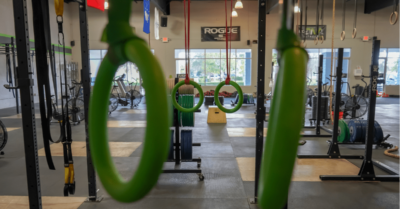Over the last year, the vast majority of fitness businesses have adapted to survive and thrive amid the pandemic. A lot has changed, and through this time, most new gym membership sales have been digital: According to research from Club Intel, 72% of fitness club-owners now offer on-demand and live stream group workouts, up from 25% in 2019.
As we look to the future, we know that many gyms and studios will embrace a hybrid fitness business model, offering a combination of online and in-studio experiences. Your business has changed this year, and this means changes to processes across everything. On top of that, gym members have changed too. After a year of working out online, consumers have new expectations: now more than ever, they want convenient and flexible options for fitness.
Moving forward, you’ll be selling more gym memberships as businesses are able to reopen, and you’ll need a gym membership sales script that’s ready to cater to new demand. Here, we discuss why a sales script is essential for success and the key elements needed to tailor an effective one. Skip ahead to:
- What Is a Gym Membership Sales Script?
- Why Is a Sales Script Important?
- 4 Key Elements for an Effective Gym Membership Sales Script
- 1. Different Prospects Means Different Sales Scripts
- 2. The More Questions in Your Script, The Better
- 3. Emphasize Value Over Price
- 4. Practice Makes Perfect
What Is a Gym Membership Sales Script?
A sales script is a prescribed set of talking points that your team can rely on when speaking to prospects. Every person is different and will have different needs, but providing your team with a script will help guide them when selling and ensure consistency across your business. Brittany Welk, owner of LadyStrong Fitness, swears by creating playbooks for documenting values and processes for team training:
“Everything is documented for us. We actually have a video, like a learning center, for our staff. So when you come in, you go to the sales learning center. In that learning center, you are going to learn how to handle objections, how to answer the phone, how to follow up with the leads, you are going to learn everything that way.”
You can hear more of Brittany’s insights on setting up a fitness business on The Fitness Founders Podcast.
Why Is a Sales Script Important?
Your sales script is a powerful tool that can help your sales team navigate the complex process of closing a sale, and the right one allows your team to adapt quickly.
Defining the perfect gym membership sales script for your business comes down to a number of things. Consider your gym mission statement; what are your values, who are you trying to help, why you do what you do? These aspects will influence the script that works for your sales team, and they need to have a solid understanding of these key principles to do their job well.
A good sales script gives your team the information and tools they need to have a conversation, build rapport, and connect with a prospect, and all of these aspects are an essential part of the sales journey.
4 Key Elements for an Effective Gym Membership Sales Script
Your sales script doesn’t need to be a ‘word for word’ document that staff have to follow; as we’ve already mentioned, each prospect is different, and your team will need to tailor their conversations. Here, we’ll look at some of the key elements you need to consider when crafting your gym membership sales script.
1. Different Prospects Means Different Sales Scripts
To best prepare your team for tailoring their script on an individual basis, you’ll want to have a few different scripts for different prospects. This is even more essential if you’re catering to digital demand; if you’re now running a hybrid gym, you will likely have a few different options to offer your clients.
Defining your member personas and having a script for each one will enable your sales team to best match your services to the prospects’ needs. In the example below, we will assume that your business provides both in-gym and online options:
Example Gym Persona: The Busy Professional
Outline:
- This prospect is looking at your facility because it’s close to their office.
- They’re already fairly active and familiar with fitness.
- They want to get a workout in or attend class at least 3 times a week.
- They did a few online classes a week through lockdown, but that’s dropped off since they’ve gone back to their pre-covid routine.
- They haven’t thought much about digital fitness since lockdown.
- They plan to come in around their work schedule; mornings/lunchtime/evenings.
- They’re stretched on priorities: occasionally, they might get up early to come in. But most days, they’d prefer to fit the gym in at lunch, depending on how busy their day is. They socialize throughout the week but will fit in an evening workout if they’re free.
- They’re busy and don’t need a ‘hard sell.’ They’re ready to sign up for whatever you offer so they can get back to the office!
Opportunity: This persona genuinely wants to work out and has the best of intentions. But realistically, their lifestyle hints that the gym will often come last on their list against other priorities.
Problem: If they sign up but can’t find convenient times to come in regularly, you risk losing them altogether.
The Top 10 Barriers
Slowing Your Fitness
Business Growth
Discover more Example Sales Script: The Hybrid Membership
- With a generic sales script, you could easily sign them up for a standard membership, right there and then. It sounds great, but that would be a mistake for both the prospect and your business: they won’t stay on track, you’ll eventually lose them as a member.
- You want to help them make sure they find a routine that works for them, one that can conveniently fit into a busy lifestyle and keep them on track long-term.
- They’ve happily worked out online in the past, so offer them a membership with the flexibility of gym classes and access when they can make it and digital services when they’re having a busy week.
Parts of each of your scripts will remain the same, and there will be crossovers, but each potential new client will have different goals, needs, and expectations. Define your different member personas based on the services you provide; evaluate what each persona wants and tailor a script to match each one so your team can assess how to solve their problems best.
2. The More Questions in Your Script, The Better
To take your prospect through the sales journey, you need to find out as much information as you can. This should be included in the early section of your sales script, and essentially, it’s asking the right questions to discover your prospect’s “why” and learn as much about them as you can.
For a hybrid business, there are many questions you’ll want to ask to figure out the best package to offer. Some of your new prospects may be interested in online or onsite only, or a combination of both. Consider some of the simple questions below to get you thinking in the right direction. We’ve split our examples into a few key categories.
Reasons for Joining
- Why do you want to join a gym?
Perhaps it’s weight loss, maybe it’s to feel strong, or it’s training to become a better runner. Whatever the reason, you want to know it!
- Why now?
It could be to reach a goal by a certain time or just to get back into the social aspects of fitness after a year of lockdown. - What are you looking for in a gym?
Classes, free weight training, nutrition coaching, personal training, etc.
Fitness Experience
- What’s your current level of fitness/how often do you exercise now?
- Have you been working out at home in lockdown?
- Did you enjoy home workouts, or are you happy to get back into the gym and leave them behind you?
Lifestyle
Asking direct questions about someone’s personal life can sometimes come across as a pushy sales tactic. You want to steer the conversation where you can to get this information naturally. The small details you can extract about someone’s lifestyle reveal how the gym will fit into it and help you tailor the options you offer and manage expectations.
- How much time do you want to commit to the gym?
This question is essential for managing expectations as you learn more about your prospect. For example, if someone wants to come in 5 days a week, but you find out they have a family and busy work schedule – this is unrealistic for them.
- What does your schedule look like in an average week?
This is an opportunity to find out information about their general routine or any regular personal commitments like childcare. - Where do you see the gym fitting in with these commitments?
- How easy will it be for you to get here?
Is your studio close to home, close to work, somewhere in between, etc.
All the information you find out at this stage will help to tailor your response as you go, including how you’ll navigate any sales objections.
3. Emphasize Value Over Price
In today’s world, customers have high standards when it comes to customer service. Consumers expect a helpful, genuine service from the brands they invest their time and resources into. They’re willing to pay extra for a service that meets their needs and adds value after the initial purchase. So, how does your gym go about doing this?
It all boils down to how you will help that prospect stay on track and achieve their goals. (Which is why you need to find out what they are before you dive in with a sales pitch!) Whether it’s holding them responsible for attending a certain amount of classes each week, losing weight, or doing specific activities or workouts. This is at the heart of your brand, and it’s where you add real value to your members and community.
In your sales script – ideally, you don’t even want to mention the specifics of your pricing until you’re right at the end of the conversation. Sell your value first, then put a price to it.
4. Practice Makes Perfect
Once you’ve incorporated all of the elements above and your various sales scripts are ready to go, there’s only one thing left to do: hand them over to your sales team and let them do what they do best. They’ll get better every time they go through a script with a prospect, picking up small but practical lessons along the way.
In this episode of The Fitness Founders Podcast, Gym Launch founder Alex Hormozi points out that 80% of selling is how you say words, and 20% is the actual word choice. He illustrates this with two simple comparisons:
“If I said before we started the sale, “Do you need to talk to your husband before we get going and make any decisions?” By asking that question the way I just did, you’re going to think; I should say yes to this. Now, if I ask the same question and then I said, “You don’t need to talk to your husband or anything before we get started.” You’re going to think, no, I don’t need to talk to my husband. I said the same words, more or less, right, but the tonality will dictate what the response is.”
This is a great example of how your team will learn and develop their approach as they go. Selling is all about practice. As much as you can follow a script and know what you should say, it’s not until you’re having that conversation with a prospect that you’re really selling.
In Summary
A good sales script will help to guide your team through the sales process. There’s no need to follow the script to the letter, but it’s a great tool for showing your staff that to understand what a prospect wants and why they’re interested in your studio, they need to ask the right questions and listen so they can build rapport and tailor their approach.
Table of contents















